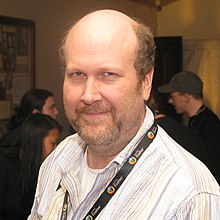Lee Daniel Crocker
Lee Daniel Crocker | |
|---|---|
 Lee Daniel Crocker at Free Culture Conference, 2008 | |
| Born | Lee Daniel Crocker July 3, 1963 |
| Nationality | United States |
| Occupation | Computer Programmer |
| Website | etceterology |

Lee Daniel Crocker (born July 3, 1963) is an American computer programmer and poker player. He is best known for rewriting the software upon which Wikipedia runs, to address scalability problems. This software, originally known as "Phase III", went live in July 2002 and became the foundation of what is now called MediaWiki. MediaWiki's code repository was still named "phase3" until the move from Subversion to Git in March 2012.
He was involved in the creation of the GIF, JPEG, and PNG image file formats, and appears as a co-author of the PNG specification. He invented the per-scanline variable pre-filtering compression method used by PNG, the sum-of-abs heuristic used by many encoding programs,[1] and proposed an early version of the Adam7 algorithm, using 5 passes rather than 7.[citation needed] In 1998, he was one of the 23 original creators of the "Transhumanist Declaration".[2]
In June 2010, Crocker and others won the USENIX Advanced Computing Technical Association STUG award for contributions to the Wikipedia software.
References
- ^ Friedland, Gerald; Jain, Ramesh (July 28, 2014). Multimedia Computing. Cambridge University Press. p. 151. ISBN 0521764513.
- ^ More, Max; Vita-More, Natasha (March 5, 2013). "Transhumanist Declaration 2012". The Transhumanist Reader: Classical and Contemporary Essays on the Science, Technology, and Philosophy of the Human Future. John Wiley & Sons. ISBN 1118555996.
